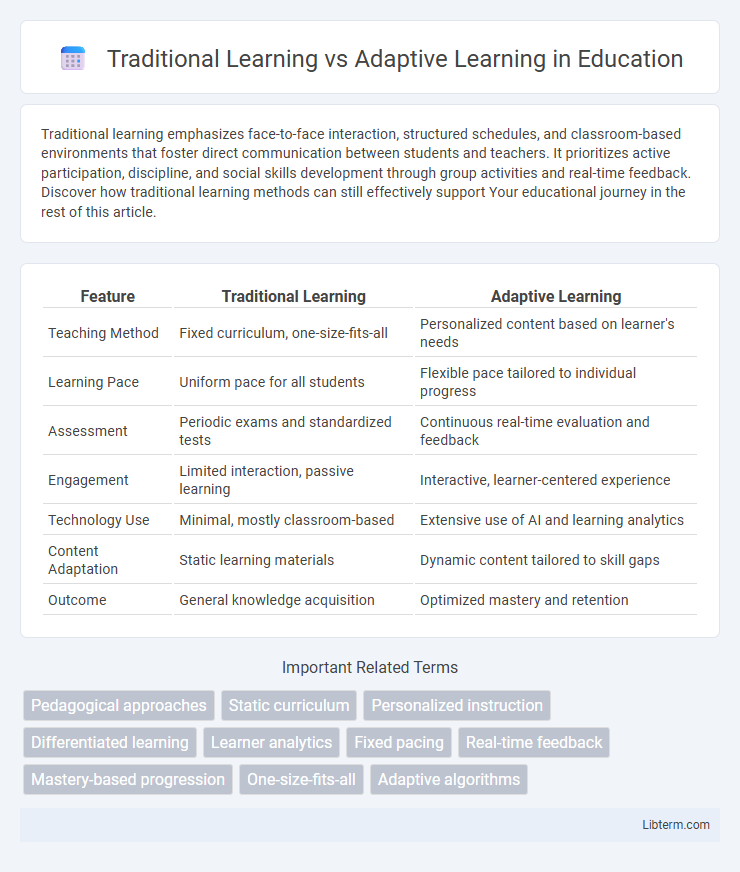Traditional learning emphasizes face-to-face interaction, structured schedules, and classroom-based environments that foster direct communication between students and teachers. It prioritizes active participation, discipline, and social skills development through group activities and real-time feedback. Discover how traditional learning methods can still effectively support Your educational journey in the rest of this article.
Table of Comparison
| Feature | Traditional Learning | Adaptive Learning |
|---|---|---|
| Teaching Method | Fixed curriculum, one-size-fits-all | Personalized content based on learner's needs |
| Learning Pace | Uniform pace for all students | Flexible pace tailored to individual progress |
| Assessment | Periodic exams and standardized tests | Continuous real-time evaluation and feedback |
| Engagement | Limited interaction, passive learning | Interactive, learner-centered experience |
| Technology Use | Minimal, mostly classroom-based | Extensive use of AI and learning analytics |
| Content Adaptation | Static learning materials | Dynamic content tailored to skill gaps |
| Outcome | General knowledge acquisition | Optimized mastery and retention |
Introduction to Learning Methods
Traditional learning relies on fixed curricula and uniform instruction, often emphasizing memorization and teacher-led activities. Adaptive learning utilizes data-driven technologies to tailor content and pace according to individual student performance and needs. This personalized approach enhances engagement and improves learning outcomes by addressing diverse skill levels within a classroom.
Defining Traditional Learning
Traditional learning refers to a conventional educational approach characterized by structured, teacher-centered instruction with a fixed curriculum and standardized assessments. This method often emphasizes memorization, passive knowledge absorption, and uniform pacing for all students regardless of their individual learning needs. Classroom environments typically involve direct lectures, textbooks, and periodic examinations to evaluate student performance.
What is Adaptive Learning?
Adaptive learning is an educational technology that customizes content and pacing based on individual learner performance using real-time data analytics and artificial intelligence algorithms. Unlike traditional learning, which delivers a uniform curriculum to all students, adaptive learning platforms continuously assess strengths and weaknesses to provide personalized feedback and targeted resources. This approach enhances engagement, improves knowledge retention, and supports mastery-based progression tailored to each student's unique needs.
Key Differences Between Traditional and Adaptive Learning
Traditional learning relies on fixed curricula with uniform pacing for all students, whereas adaptive learning customizes content and pacing based on individual learner performance using real-time data. Assessment methods in traditional learning are often standardized and periodic, while adaptive learning continuously evaluates student progress and adjusts instruction dynamically. The contrast lies in the personalized approach of adaptive learning, which enhances engagement and retention compared to the uniform, one-size-fits-all model of traditional education.
Personalization in Learning: Static vs Dynamic
Traditional learning offers a static approach where all students receive the same content and pace, limiting personalization to fixed curricula and standardized assessments. Adaptive learning employs dynamic personalization by analyzing individual learner data in real-time, tailoring content, difficulty, and feedback to each student's unique needs and progress. This personalized adaptability enhances engagement, improves knowledge retention, and supports mastery of complex subjects more effectively than one-size-fits-all methods.
Role of Technology in Adaptive Learning
Technology plays a crucial role in adaptive learning by using advanced algorithms and data analytics to tailor educational content to individual student needs, improving engagement and outcomes. Unlike traditional learning methods that rely on a fixed curriculum, adaptive learning platforms continuously assess student performance and adjust instructional strategies in real time. The integration of artificial intelligence, machine learning, and interactive software enables personalized feedback, targeted interventions, and efficient mastery of skills, making education more effective and accessible.
Student Engagement and Motivation
Traditional learning often relies on uniform instruction, which can lead to reduced student engagement and motivation due to its one-size-fits-all approach. Adaptive learning leverages data-driven algorithms to personalize educational content, enhancing student engagement by addressing individual learning styles and pacing. Research shows that adaptive learning environments increase motivation by providing real-time feedback and tailored challenges that keep learners actively involved.
Assessing Learning Outcomes
Assessing learning outcomes in traditional learning typically relies on standardized tests and fixed benchmarks, which may not fully capture individual student progress. Adaptive learning systems use real-time data analytics and personalized assessments to evaluate skills and knowledge, allowing for targeted interventions. This approach improves the accuracy and relevance of outcome measurement, leading to more effective learning experiences.
Challenges and Limitations
Traditional learning faces challenges such as fixed pacing, lack of personalized feedback, and limited accommodation for diverse learning styles, which hinder student engagement and retention. Adaptive learning systems, while addressing personalization by adjusting to individual learner needs using data analytics and AI, encounter limitations including high implementation costs, dependency on technology infrastructure, and potential data privacy concerns. Both approaches must overcome these obstacles to effectively support diverse learners in achieving optimal educational outcomes.
Future Trends in Educational Approaches
Future trends in educational approaches emphasize a shift from traditional learning models, characterized by uniform instruction and fixed pacing, to adaptive learning systems powered by artificial intelligence and data analytics. Adaptive learning tailors educational content to individual student needs, enhancing engagement and improving outcomes through real-time feedback and personalized pathways. This evolution supports lifelong learning and skills development, aligning education with the demands of rapidly changing job markets and technological advancements.
Traditional Learning Infographic

 libterm.com
libterm.com